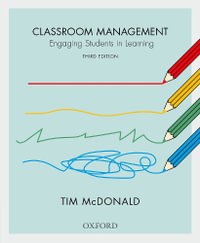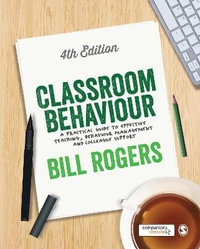Approaches to Behavior and Classroom Management focuses on teaching readers how to use a variety of approaches in behaviour and classroom management in order to make good decisions when faced with the challenge of creating positive classroom communities. Today's classrooms often include children from a variety of backgrounds and with different needs - needs that must be met if these children are to thrive in school. This text will provide teachers and other educators with the historical and cultural framework necessary to understand approaches to behavior and classroom management, a deep understanding of each approach, and a tool belt of relevant methods from which to choose to meet the needs of various situations.
Industry Reviews
"This work is a lucid approach to the pragmatic application of classroom management. It is a valuable tool in the classroom teacher's arsenal." -- Dr. Michael J. Lynch, III * Adoption Review Card * "This book moves caring from being an object of study to being a professional practice. Thinking of classroom management in terms of relationships, learning, development, organization and accommodating diversity redefines discipline. No longer is it about rules and punishments--now it is about connections and meaning making. This is a book that a teacher can really do something with!" -- George Noblit "This wise and readily accessible book fills a gaping hole in the literature preparing teachers to address classroom management. A central message of the book is that methods are not approaches. Methods that work with middle class children may not work in the same way with inner city students, or children from other cultures. The dilemma facing many teachers is how to adjust methods and still maintain integrity and coherence in their teaching. Teachers are not technicians, and methods "cookbooks" won't suffice. Effective classroom management and discipline requires self-awareness of one's underlying approach in order to adjust methods to fit the needs of particular students and contexts. Thus, instead of promoting a particular set of methods, George Scarlett and his colleagues have a done a wonderful job of grouping existing approaches according to their underlying goals, basic assumptions and historical origins. To be sure, this book does have a point of view. Classroom management is not simply about control and efficiency, it is also a basic tool for social and emotional development and learning. Bringing these goals into balance is at the heart of this book. It is also at the core of what it means to be a teacher." -- Larry Nucci "Scarlett and his colleagues write about that fertile middle ground between coercive control and hopeful laissez-faire that all good teachers must find, and they do so with a wisdom that comes from years of thinking about the dilemmas of teaching. In every chapter, the authors consider approaches to teaching children, and the range of methods supporting those approaches, through the uncommonly reasonable lens of respect--respect for the adults and the children in our schools. Their emphasis on the importance of caring, of building relationships, and on hearing the implicit and explicit messages we communicate to children, infuses every aspect of this deeply respectful introduction to the discipline of caring and caring about discipline. The authors suggest the power of reframing when we are responding to unwelcome behavior in a child, but they demonstrate the real power of reframing in their analyses of classroom management." -- Laura Rogers "This book moves caring from being an object of study to being a professional practice. Thinking of classroom management in terms of relationships, learning, development, organization and accommodating diversity redefines discipline. No longer is it about rules and punishments-now it is about connections and meaning making. This is a book that a teacher can really do something with!"-George Noblit, University of North Carolina -- George Noblit "This wise and readily accessible book fills a gaping hole in the literature preparing teachers to address classroom management. A central message of the book is that methods are not approaches. Methods that work with middle class children may not work in the same way with inner city students, or children from other cultures. Thus, instead of promoting a particular set of methods, George Scarlett and his colleagues have a done a wonderful job of grouping existing approaches according to their underlying goals, basic assumptions and historical origins. To be sure, this book does have a point of view. Classroom management is not simply about control and efficiency, it is also a basic tool for social and emotional development and learning. Bringing these goals into balance is at the heart of this book."-Larry Nucci, University of California, Berkeley -- Larry Nucci "Scarlett and his colleagues write about that fertile middle ground between coercive control and hopeful laissez-faire that all good teachers must find, and they do so with a wisdom that comes from years of thinking about the dilemmas of teaching. Their emphasis on the importance of caring, of building relationships, and on hearing the implicit and explicit messages we communicate to children, infuses every aspect of this deeply respectful introduction to the discipline of caring and caring about discipline."-Laura Rogers, Tufts University -- Laura Rogers "This title by Scarlett and Ponte and Singh is highly recommended for use as a textbook or a supplemental resource for classroom management courses." -- P.S. Arter * CHOICE magazine *
























